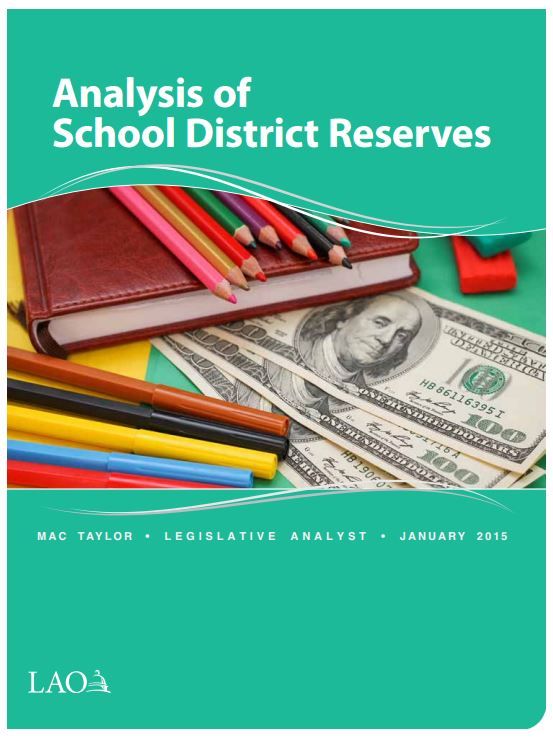Leg Analyst: School reserves law not working

 Whether finances are personal, business or government, having a reserve makes sense. You never know when an emergency might crop up and you’ll need the funds.
Whether finances are personal, business or government, having a reserve makes sense. You never know when an emergency might crop up and you’ll need the funds.
Indeed, last November voters approved Proposition 2, which increased the state’s “rainy day” fund for its budget. It was supported by Gov. Jerry Brown and most state political leaders.
But, strangely, last summer the California Legislature also passed legislation that capped local school reserves. A new report by Legislative Analyst Mac Taylor, “Analysis of School District Reserves,” found the legislation isn’t working.
Here’s how the law works:
Recent legislation includes a provision capping district General Fund reserves if, during the previous year, the state made a deposit into the state school reserve recently established by Proposition 2. The caps vary according to district size, with assigned and unassigned reserves capped at 6 percent of expenditures for mid-size districts. Districts may apply to their county offices of education for exemptions from these caps if they face extraordinary fiscal circumstances.
And here are the Leg Analyst’s recommendations:
Several Concerns With Caps, Recommend Repeal. To the extent districts begin shifting monies to avoid the caps, we are concerned that local budgeting practices could become more confusing. To the extent districts begin spending down their reserves, we are concerned that they would incur a number of risks:
- Difficulty Maintaining Programs in Tight Fiscal Times. The reserve caps would allow most districts to maintain only a few weeks of payroll in reserve.
- Difficulty Addressing Unexpected Costs. Emergency facility repairs and other unexpected costs would place districts with low reserves in a precarious position.
- Greater Fiscal Distress. Historically, districts with reserves below the caps have been about twice as likely to be flagged for fiscal intervention as their peers with higher reserves.
- Higher Borrowing Costs. Districts with lower reserves could have their credit ratings reduced, increasing the cost of borrowing money.
We also are concerned that the caps become operative following any deposit into the state school reserve—even if the size of that deposit is much smaller than the triggered reduction in local reserves. To avoid all these risks, we recommend the Legislature repeal the reserve caps.
That all seems common sense, doesn’t it? Why was this law passed in the first place?
Related Articles
Teacher tenure bill defeated in Assembly
On Thursday, the California Assembly Appropriations Committee voted to hold Assembly Bill 753, in effect killing the bill for this legislative
CA Loses $727K on Green Car Flop
John Seiler: Governments almost always lose money when the try to out-guess market demand by investing the taxpayers’ money in
New reports show CA is sinking
As use of California’s groundwater supply reaches an all-time high, the state’s drought-induced sinking has put California land at historic




